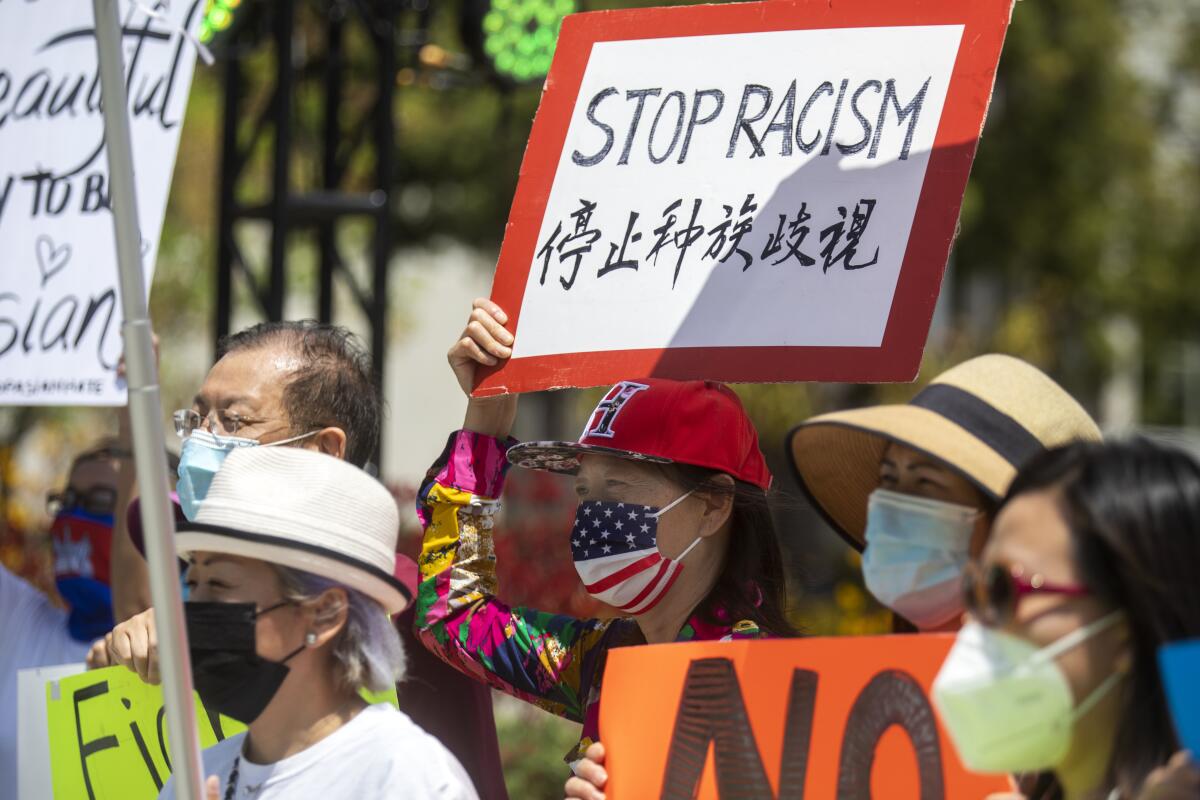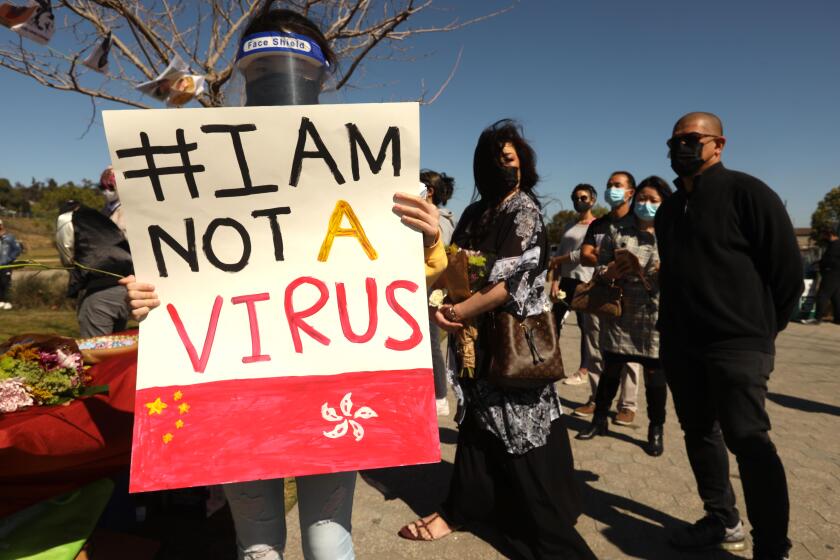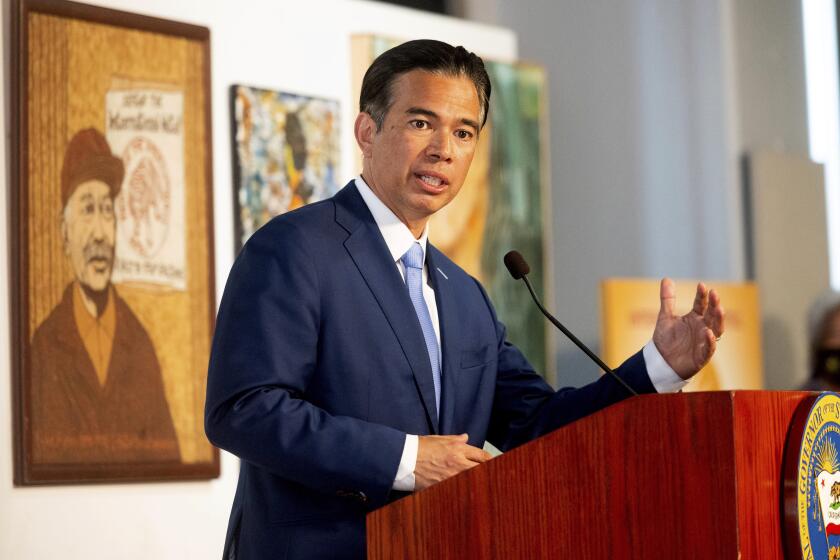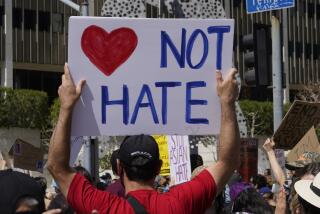Anti-Asian hate attacks are down in L.A. Why some are worried

- Share via
After hitting record highs in 2021, anti-Asian hate attacks have significantly decreased both in the Los Angeles area and statewide.
The trend has prompted relief but also concern that some Asian Americans are not reporting attacks against them as attention on the topic fades.
Early in the COVID-19 pandemic, attacks on Asian Americans rose, fanned in part by rhetoric from then-President Trump that highlighted the coronavirus’ Chinese origins.
But reports of anti-Asian hate crimes and incidents in areas patrolled by the Los Angeles County Sheriff’s Department — including unincorporated communities and the cities of West Hollywood and Diamond Bar — fell 60% in 2022 compared with 2021, from 30 to 12, even as overall hate attacks rose.
Hate crimes include violent crimes such as homicide and assault, as well as nonviolent crimes such as racist graffiti.
Hate incidents consist of verbal abuse, harassment, bullying and other behavior that is hate-motivated but doesn’t rise to the level of a crime.
About 68% of the anti-Asian attacks documented during the pandemic were verbal harassment, 21% were shunning and 11% were physical assaults.
In the city of Los Angeles, anti-Asian hate crimes decreased by 15% in 2022 compared with 2021.
Blake Chow, deputy chief of the Los Angeles Police Department, said anti-Asian hate crimes and incidents in 2023 have dropped about 30% compared with the same time period last year.
So far this year, the LAPD has logged 18 anti-Asian hate crimes, a number that Chow called “way too low” in a city of 4 million because it indicates underreporting.
“I don’t think those numbers are really reflective of what’s happening out there,” he said.
Statewide, anti-Asian hate crimes fell more than 40% in 2022 to 140, according to a report released in late June.
Det. Jan Wong, hate crimes coordinator for the L.A. County Sheriff’s Department, attributed the decline in her jurisdiction in part to victims’ increasing hesitation to come forward.
“More than likely, those incidents are occurring. That’s what the community is telling us, but we just don’t have the numbers to back it ... because people are reluctant to report,” she said.
Both Chow and Wong spoke at the LAPD’s Asian American Pacific Islander symposium at the Chinese American Museum in late June.
“Now that … the fear about the pandemic has receded from its crest, it doesn’t surprise me at all that we would see a drop in numbers,” said Charles H. Jung, executive director of the California Asian Pacific American Bar Assn.
Jung, however, noted that the numbers remain elevated compared to before the pandemic. In 2019, law enforcement agencies in California reported 43 anti-Asian hate crimes, compared with the 140 reported last year.
From assaults on senior citizens in the Bay Area to the shooting of six women at Atlanta-area spas, violence against Asians has surged during the pandemic.
The rise in anti-Asian hate during the pandemic prompted California to spend tens of millions of dollars supporting community-based organizations. It also led to new laws and community initiatives. Those efforts are bearing some fruit, said Manjusha Kulkarni, co-founder of Stop AAPI Hate.
Still, “it is difficult to know whether in fact, the drop signifies a decrease [in anti-Asian hate] or a decrease in reporting,” she said, adding that her own organization’s database has not shown a big drop in the number of incidents.
Hate crimes are significantly underreported, with victims reluctant to tell their stories to law enforcement. That is especially the case for the Asian American community, said Hong Lee, president of Seniors Fight Back, which organizes self-defense classes for senior citizens.
“During my classes, I’m actually seeing quite a few victims who are disclosing to us they had been assaulted, they had been robbed at gunpoint, they’ve had racial slurs, and they unfortunately are not reporting these incidents,” she said.
At a February class in Monterey Park, Lee said three students told her they were physically attacked, though it was unclear whether the incidents were racially motivated. None reported the incidents to law enforcement, she said.
“We internalize a lot of things, and unfortunately, we’re not reporting, and we’re getting into the habit again,” she said. “After the mass shootings in Atlanta ... people started becoming more bold and speaking up, but unfortunately, I think [not reporting] has just become the norm now.”
At the LAPD symposium, community leaders called for law enforcement agencies to provide more support for victims, which could encourage more people to report.
Speaking at a different panel in Carson, Gabriel Roque voiced frustration at the slow pace of the prosecution against a man who shouted, “You’re so Asian,” then assaulted Roque and family members at a McDonald’s drive-through in North Hollywood last year.
A judge dropped a hate crime enhancement against the defendant, although he still faces charges of battery.
“We still haven’t gotten the justice we have been demanding for us and other victims,” said Nerissa Roque, Gabriel’s wife, who was also attacked.
Jung said the community’s fear hasn’t gone away. A survey released in May found that more than half of Asian Americans feel unsafe in at least one type of public space, with nearly 30% saying they don’t feel safe on public transportation.
Anti-Asian rhetoric could escalate leading up to the 2024 presidential election, Jung said. Several states have passed bills banning Chinese citizens from buying property, which critics say evokes the alien land laws of the early 20th century.
“As a community, the best thing we can do is prepare for the next moment, when the elevated fear in the broader American community leads to violence against Asian bodies,” he said.
More to Read
Sign up for Essential California
The most important California stories and recommendations in your inbox every morning.
You may occasionally receive promotional content from the Los Angeles Times.













